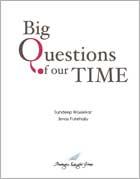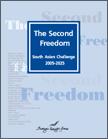Neil Fergusson, Collosus
 |
July 2006
By Sundeep Waslekar
|
Prof Niall Ferguson�€™s Colossus is very strong in intellectual vigour. It is rather weak in its moral persuasion.
The central argument of Colossus is that the American empire is likely to decline because of its internal weaknesses and may not be replaced by another empire. In fact, there will be a period of absence of polarity rather than multi-polarity. All kinds of terrorist and criminal groups with global reach will fill the vacuum.
Prof Ferguson argues that America�€™s decline might take place sooner rather than later because of fiscal deficit and manpower deficit. Since European Union and China have internal contradictions, they have no ability to replace the United States when the latter disappears as a superpower. Therefore cooperation between the United States, Europe and China may not only be desirable but also inevitable.
Every sensible person would agree with Prof Ferguson�€™s analysis as summarised above. The problem arises with his solutions. What he has to offer is nothing short of a set of indecent proposals.
In order to reduce America�€™s fiscal deficit, the author implicitly proposes reduction in medical care and social security expenditure, while increasing outlays for military interventions and consolidation of American power in occupied countries. In order to reduce the manpower deficit, he explicitly proposes the recruitment of 2 million prisoners from the US jails, minorities and foreigners in the American armed forces. He remembers that the Roman Empire recruited foreigners in exchange of citizenship and the United States can do the same for hiring people poor countries as cannon fodders for its army. He forgets that the Roman Empire collapsed primarily because of it habit to recruit mercenaries.
He believes that an army full of prisoners and foreigners in despair will make American a great power. He forgets that America has actually lost its appeal to many other parts of the world, including Europe and Canada, because of the erosion of it moral leadership. The United States led a highly principled community of values on the two sides of Atlantic. That is what made it a great power, besides its technological, economic and military strengths. The central problem with the United States today is that its values of dictating and warmongering are not acceptable to growing segments of population abroad and potentially even some segments of population at home.
He also recommends colonisation of countries in the developing world that are incapable of managing their own affairs. He cites Liberia and Iraq as two examples to prove his points. He rues that the United States has not taken over Liberia and hopes that the United States will stay long in Iraq since under Saddam Hussein, Iraq�€™s population not only lost its liberties but also their prosperity.
As for Iraq, it is well known that the United States was chummy with Saddam Hussein until 1990. At least there is no public evidence of the US urging Iraqi leadership of improving its internal governance while Iraq was engaged in a war with Iran to stop the Shia revolution spreading further to the West. To say that Iraq mismanaged its internal affairs after 1990, and not earlier, is to ignore basic facts.
As for Liberia, I am reminded of a debate in Africa about a decade ago when some social scientists were making a case for re-colonisation of Africa by five big countries. Liberia and many other countries in the developing world are not poor because they miss colonisation. They are poor because they are excessively colonised by a small section of the elite, often in partnership with foreign capital. If these countries have to improve their lot, it is important they have the benefit of genuine internal democracy.
Prof Ferguson�€™s book is a case for power politics. He admonishes the United States to cooperate with Europe and China because the latter two hold some levers of power. He wants the United States to be a liberal empire to lord over those who do not have power.
The proposals made in the book are at best indecent and at worst dangerous. It is unfortunate that the current Western scholarship is producing end of history, clash of civilizations and a case for imperialism. The fact that it can no longer produce a sequel to The Common Sense reveals the real problem with the West. With such a massive intellectual vacuum, the West needs to reinvigorate itself morally and intellectually instead of looking for justification sometimes to help, sometimes to own, and sometimes to overthrow local imperialists in poor countries.
Related Publications
-
.jpg&maxw=50)
Big Questions of Our time: The World Speaks, 2016
Download:Big Questions of Our time: The World Speaks _Full Report
-

-

Second Freedom South Asian Challenge 2005-2025, 2005
read more
Download:Second Freedom South Asian Challenge 2005-2025 Full Report
Related latest News
Related Conferences Reports
-

Global Challenges Conference, October 2016
Download:Global Challenges Conference Report
-

Conference on Responsibility to the Future: Business, Peace and Sustainability, June, 2008
Download:Global Security and Economy: Emerging Issues


